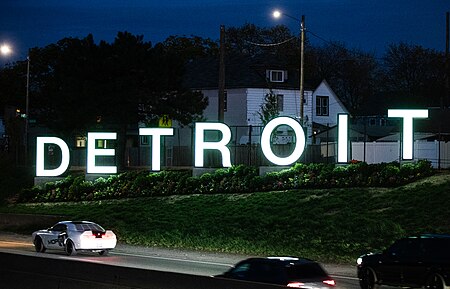Detroit Sign

The Detroit Sign is an American landmark in Detroit, Michigan. Constructed in preparation for the 2024 NFL draft hosted in the city, the structure is located near Interstate 94 to welcome visitors arriving from the Detroit Metropolitan Airport. The sign, built by the Fairmont Sign Company, spells out the word "Detroit" in eight-foot-tall (2.4 m) and five-foot-wide (1.5 m) mint green uppercase letters. The letters stand on two-foot-tall (0.61 m) concrete bases and light up at night. It is one of six signs commissioned by the city as part of its beautification efforts for the draft. Public reaction to the sign was mixed, with criticisms focusing on the design of the letters and disappointment arising after city officials had suggested it would resemble the Hollywood Sign. A song by rapper Gmac Cash about the sign went viral shortly after the completion of its construction. Officials have suggested that the disappointment and criticisms stemmed from an artificial intelligence image that circulated on social media after the project was announced, which differed from their own renderings.
Excerpt from the Wikipedia article Detroit Sign (License: CC BY-SA 3.0, Authors, Images).Detroit Sign
Edsel Ford Freeway Service Drive, Detroit
Geographical coordinates (GPS) Address Nearby Places Show on map
Geographical coordinates (GPS)
| Latitude | Longitude |
|---|---|
| N 42.3325 ° | E -83.137 ° |
Address
Edsel Ford Freeway Service Drive 7547
48210 Detroit
Michigan, United States
Open on Google Maps






